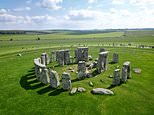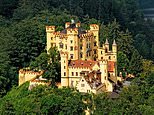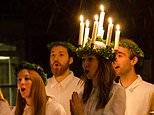From flaming fireballs to 'ghost saunas': The top 20 quirky European Christmas traditions Brits would most like to experience
- The ranking is from a poll in which 90% said they're keen to try a quirky tradition
- The entries include traditions in Austria, Denmark, France and Portugal
- READ MORE: Tourists share the dishes they fell in love with abroad
Forget mince pies and mistletoe, Brits have revealed that they're keen to try out Christmas traditions different to those that they usually observe at home.
That's according to an easyJet survey of 2,000 people in which 90 per cent of respondents said they're keen on experiencing an alternative festive tradition and 80 per cent said that they'd like to travel abroad to try one out.
The poll produced a ranking of the 20 alternative Christmas traditions that Brits would most like to try out during December and the festive period.
What they're keen on includes traditions involving flaming fireballs, 'ghost saunas' and medieval markets.
Sophie Dekkers, easyJet's Chief Commercial Officer, said: 'We hope this list helps inspire both seasoned travellers as well as first-time visitors to explore more of the places they love or visit a new destination and experience its unique customs first hand.'
Scroll down for the full list. Which one would you most like to experience?
1. St Lucia Candlelight Procession Parade at Tivoli Gardens in Copenhagen, Denmark – 29 per cent

The Christmas candlelight procession at Tivoli Gardens (above) is the No.1 alternative European festive tradition for Brits
Taking first place is a candlelight procession in Tivoli Gardens, Copenhagen, that sees the 174-year-old amusement park illuminated by thousands of fairy lights and tree lights.
2. Christmas 'ghost sauna' to connect with departed ancestors, Finland – 19 per cent
On Christmas Eve, it's traditional for Finnish residents to have a sauna session to connect with departed ancestors.
Afterwards, they celebrate outside while their ancestral wraiths take their place in the sauna.
3. Fireball swinging, Stonehaven, Scotland – 18 per cent

Dramatic: In Stonehaven, the new year is seen in with flaming balls being swung around. The rite ranks third in a list of 20 quirky European Christmas traditions Brits would most like to experience
In Stonehaven, the new year is welcomed by midnight chimes ringing out and dozens of people swinging flaming balls around their heads as they parade up the high street.
Fireworks complete the fiery celebration.
4. Provins Medieval Market, France – 18 per cent

The medieval market (fourth) in Provins puts a historical twist on Christmas
A special medieval Christmas market in Provins, near Paris, puts a unique historical twist on traditional festivities, with jugglers, fire-eaters and dancing to medieval music.
5. St Nicholas Day Parade, Küssnacht village, Switzerland – 17 per cent
A parade of 1,400 boys and men carrying bells and dressed in traditional shepherds' outfits walk through the village of Küssnacht on the shores of Lake Lucerne on December 5, the eve of St. Nicholas' Day.

The St Nicholas Day Parade (fifth) in Küssnacht village in Switzerland sees huge bishops' mitres on show
They're followed by others wearing huge bishops' mitres, headdresses made of cardboard and coloured tissue paper lit from the inside by candles. The effect is a parade of stained-glass windows.
6. Krampus Night, Austria – 13 per cent
In Austrian folklore, Krampus is a creature that will punish naughty children just before Christmas. On December 5, it's customary for people dressed as Krampus to parade through the streets.
7. Morcote bell-ringing, Switzerland – 13 per cent

The bells of the Church of Santa Maria del Sasso in Switzerland are rung by hand in the nine days before Christmas (seventh)
During the nine days before Christmas and on Christmas Eve, the people of Morcote village, on the shores of Lake Lugano, meet in the bell tower of the Church of Santa Maria del Sasso in the evening, for eating and drinking. One after another, all the attendees get up, climb a ladder to the church bells, and ring them by hand.
8. The Yule Lads, Iceland – 12 per cent
Thirteen mischievous troll-like characters visit children in the 13 days leading up to Christmas, leaving gifts or rotting potatoes in shoes, depending on how well they have behaved that year.
9. Bananas in Braga, Portugal – 12 per cent
The 'Bananeiro' is a Christmas tradition that takes place in the historical centre of the Portuguese city of Braga at Casa das Bananas, a wine store that used to double as a banana warehouse. The owner used to give his customers bananas to help settle their stomachs. Today, crowds gather at the store on Rua do Souto on Christmas Eve to drink muscat wine, eat a banana and chat with friends and strangers alike.
10. Christmas pickle, Germany – 11 per cent
Christmas trees in Germany include a unique decoration – a pickled cucumber hidden deep within the branches on Christmas Eve. The first child to spot it receives a gift.
11. Perchten, Austria and Bavaria – 11 per cent
Perchten is a pagan festival in Austria and Bavaria in which people dress up as beasts and devils in extraordinary costumes to frighten away the evil spirits of winter by out ugly-ing them. The festival is linked to the 'Christmas witch' Frau Perchta, who is said to roam the countryside during the 12 days of Christmas, rewarding the good and punishing the bad.
12. St Lucia Day, Sweden – 11 per cent

Choristers wear candles in their hair for the celebration of Lucia in Sweden (12th)
Celebrated on December 13, the annual celebration of Lucia in Sweden involves girls and boys clad in white full-length gowns singing songs together and wearing candles in their hair. Saffron buns are eaten as part of the experience.
13. Broom hiding, Norway – 10 per cent
According to Norwegian folklore, witches come to houses on Christmas Eve to frighten people and steal brooms to ride. So it's a Christmas Eve tradition to hide brooms and mops to stop this from happening.
14. La Befana, Italy – 10 per cent
On January 6, the Epiphany, old witch La Befana delivers gifts Santa Claus-style to children.
15. Il Rogo del Vecchione, Bologna, Italy – 10 per cent
On New Year's Eve in Bologna, an effigy is burned in the Piazza Maggiore to symbolise the end of the old year and the start of the new. The effigy is based on the year's most notable events.
16. J-Dag, Demark – nine per cent
A modern tradition dating to 1990, J-Dag, or J-Day, is the day when Tuborg Brewery's Julebryg - Christmas beer - is released. The beer, a strong pilsner, becomes available on the first Friday of November, with its launch kicking off the Christmas season for Danes.
17. Kallikantzaroi, Greece – nine per cent
Kallikantzaroi are mischievous goblins that emerge during the 12 days of Christmas to cause trouble. The Greeks keep them at bay by lighting fires in their hearths – to stop them climbing down the chimneys – placing colanders on doorsteps (believing the unintelligent goblins will get confused trying to count the holes) and hanging holly and garlic.
18. Shoe-throwing, Czech Republic – eight per cent
In the Czech Republic, single women hurl a shoe over their shoulder and out of the front door. The shoe is then inspected - if it lands with its toe end pointing in the direction of the door then that means they are getting married that coming year.
19. Caga Tió, Catalonia, Spain – seven per cent
Caga Tió is a Catalan tradition where a wooden log with a painted face is 'fed' in the lead-up to Christmas and then beaten with sticks to 'poop' presents on Christmas Eve.
20. Mari Lwyd, Wales – six per cent
A tradition where a horse's skull, decorated and mounted on a pole, is carried door to door. Participants engage in a battle of rhymes with the householders.

On Christmas Eve, it's traditional for Finnish residents to have a sauna session to connect with departed ancestors (second in the ranking)











































































































